The Best 10 Alternatives to Forticlient (+ Pricing & Reviews)
Twingate Team
•
Jul 27, 2024

FortiClient is a security solution by Fortinet that offers Zero Trust Network Access, web filtering, software inventory management, and automated response for endpoint protection. While it provides comprehensive features, it may not suit everyone's needs. This article explores the importance of endpoint security and management.
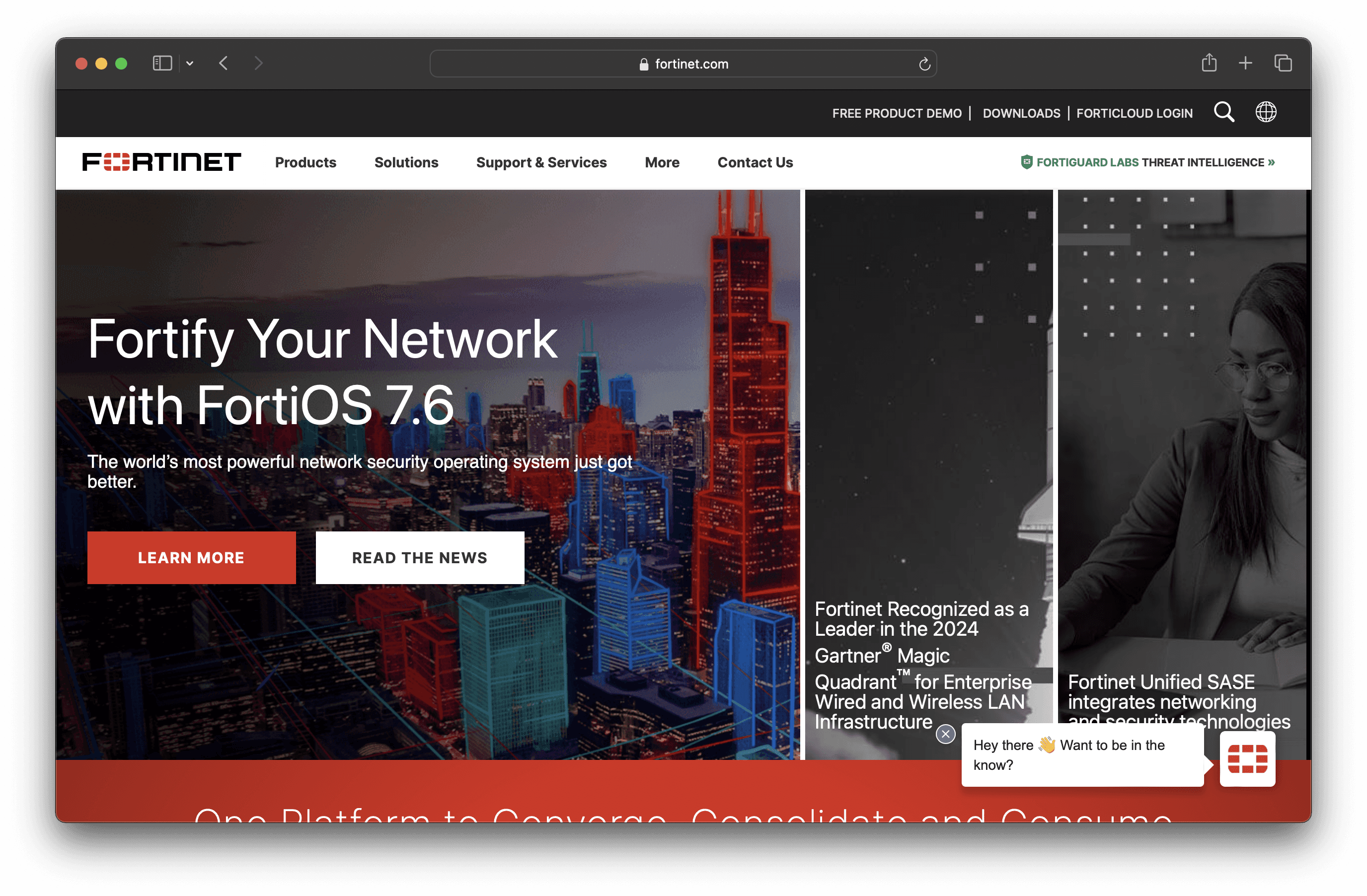
10 Alternatives to Forticlient
1. Trend Vision One
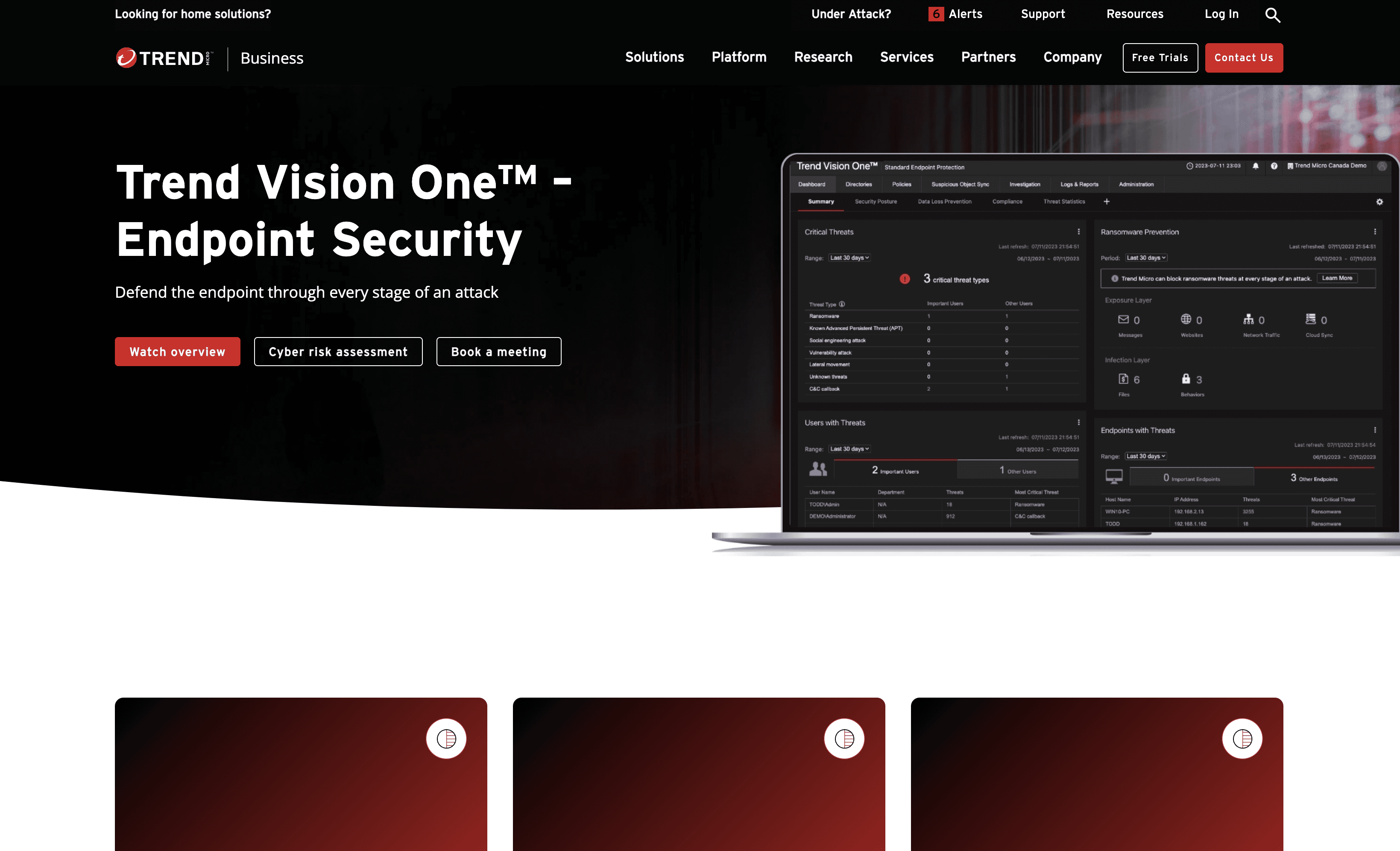
Trend Vision One is a comprehensive endpoint security solution by Trend Micro. It consolidates endpoint, server, and workload security with centralized management. The platform enhances detection and response capabilities, streamlines IT operations, and offers advanced threat protection, making it suitable for businesses seeking robust and efficient security measures.
Trend Vision One Pricing
Trend Vision One's pricing is not public. Contact their support for more info.
Trend Vision One Reviews
Trend Vision One has an overall rating of 4.7 out of 5 stars based on 183 reviews. Users praise its comprehensive threat intelligence and ease of use. Check out more of our reviews here!
Pros and Cons of Trend Vision One
Pros:
Centralized management consolidates endpoint, server, and workload security, providing a unified view and streamlined operations.
Enhanced detection and response capabilities with EDR and XDR offer comprehensive threat visibility and faster incident resolution.
Layered protection ensures robust defense across all attack stages, proactively mitigating vulnerabilities before they can be exploited.
Cons:
Complexity in managing the comprehensive features may require significant expertise and resources, posing a challenge for smaller teams.
High cost of advanced security solutions and managed services can be a barrier for budget-conscious organizations.
Integration with existing systems and workflows might be difficult, depending on the current infrastructure and compatibility.
2. Cylance
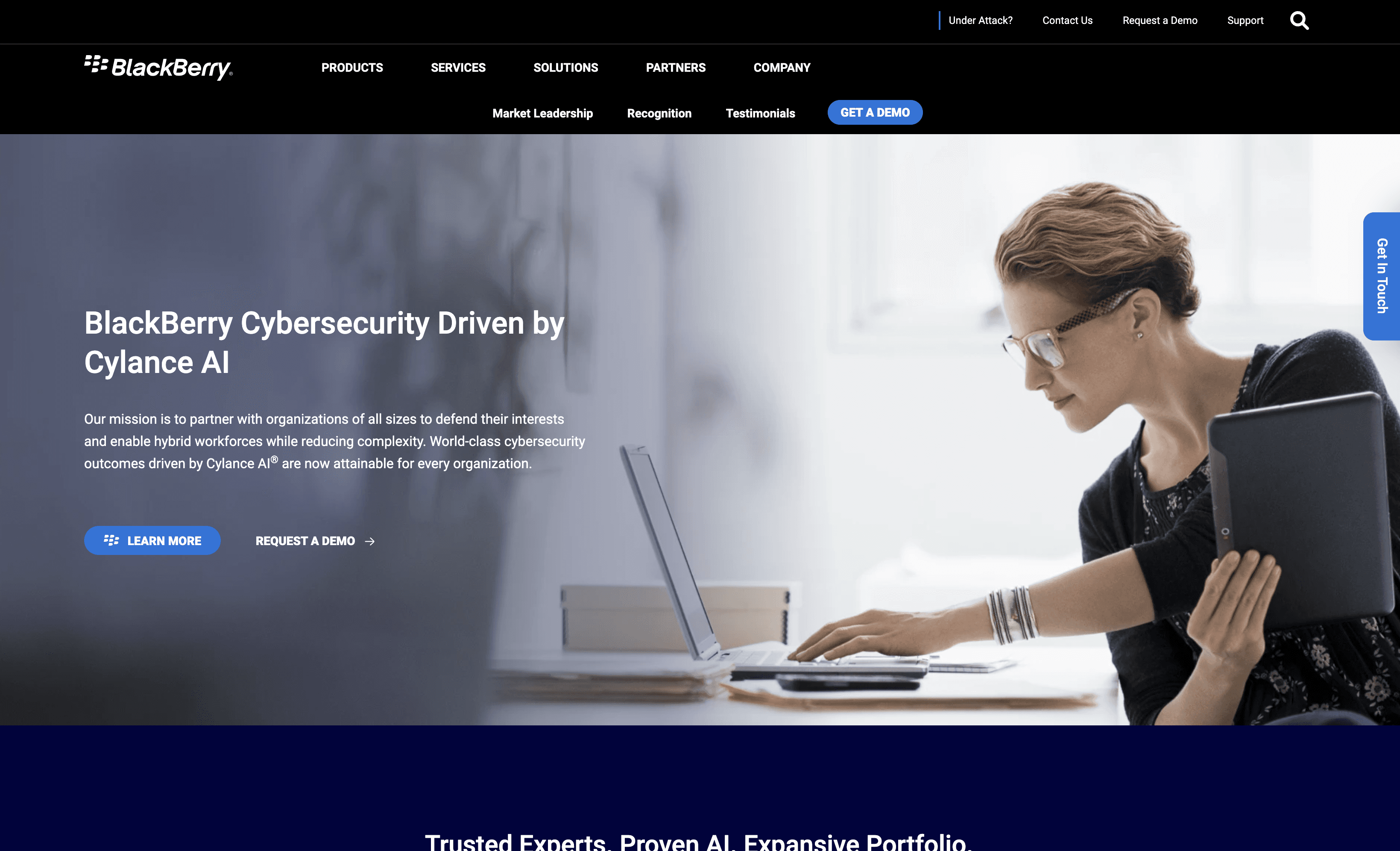
Cylance is an AI-driven cybersecurity solution by BlackBerry, designed to prevent, detect, and respond to threats across endpoints. It offers low CPU utilization and integrates seamlessly with existing infrastructure, making it a practical choice for businesses seeking robust and efficient security measures.
Cylance Pricing
Cylance's pricing is not public. Contact their support for more info.
Cylance Reviews
Cylance has an overall rating of 4.3 out of 5 stars based on 57 reviews. Users appreciate its ease of use and AI-driven approach. Check out more of our reviews here!
Pros and Cons ofCylance
Pros:
High Efficacy: Cylance AI-driven solutions deliver some of the highest efficacy ratings in the market, ensuring robust protection against threats.
Low CPU Utilization: Uses up to 20x less CPU, even offline, making it efficient and less resource-intensive.
Comprehensive Security: Provides broad, integrated controls spanning network, endpoint, and cloud, offering a holistic security approach.
Cons:
Initial Training Required: The product needs an initial period to be "trained" to the specific environment, which can be time-consuming.
Compatibility Issues: Some users report difficulties integrating Cylance with existing systems, leading to potential operational disruptions.
False Positives: There are instances of false positives, which can cause unnecessary alerts and require additional management.
3. Sophos Intercept X Endpoint Protection
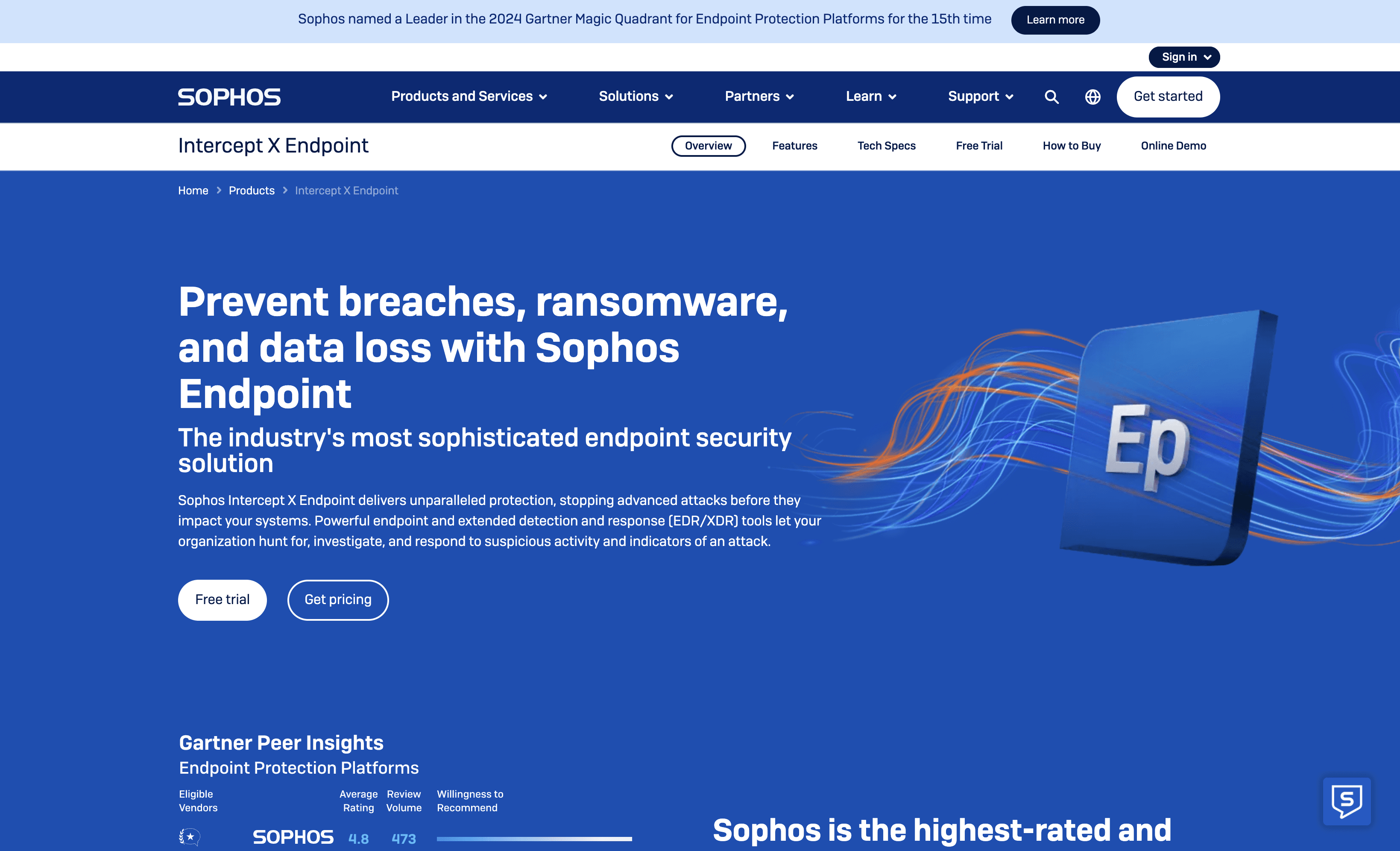
Sophos Intercept X Endpoint Protection is a security solution designed to prevent, detect, and respond to threats using advanced technologies like AI and behavioral analysis. It offers comprehensive protection against ransomware, exploits, and data breaches, making it a reliable choice for businesses seeking robust endpoint security.
Sophos Intercept X Endpoint Protection Pricing
Sophos Intercept X Endpoint Protection's pricing is not public. Contact their support for more info.
Sophos Intercept X Endpoint Protection Reviews
Sophos Intercept X Endpoint Protection has an overall rating of 3.9 out of 5 stars based on 30 reviews. Users appreciate its ease of use and effective ransomware protection. Check out more of our reviews here!
Pros and Cons of Sophos Intercept X Endpoint Protection
Pros:
High Customer Ratings: Sophos Intercept X boasts a 4.8/5.0 rating based on 473 reviews, reflecting strong user satisfaction.
Comprehensive Security: Incorporates AI, behavioral analysis, anti-ransomware, and anti-exploitation technologies for robust protection.
Ease of Management: Managed through a cloud-based platform, simplifying the deployment and maintenance of security measures.
Cons:
False Positives: Users report occasional false positives, which can lead to unnecessary alerts and additional management.
Integration Issues: Some users experience difficulties integrating with newer Windows versions, causing potential disruptions.
Speed Issues: Initial boot-up times and system functions can be slow, particularly on non-SSD drives.
4. Carbon Black
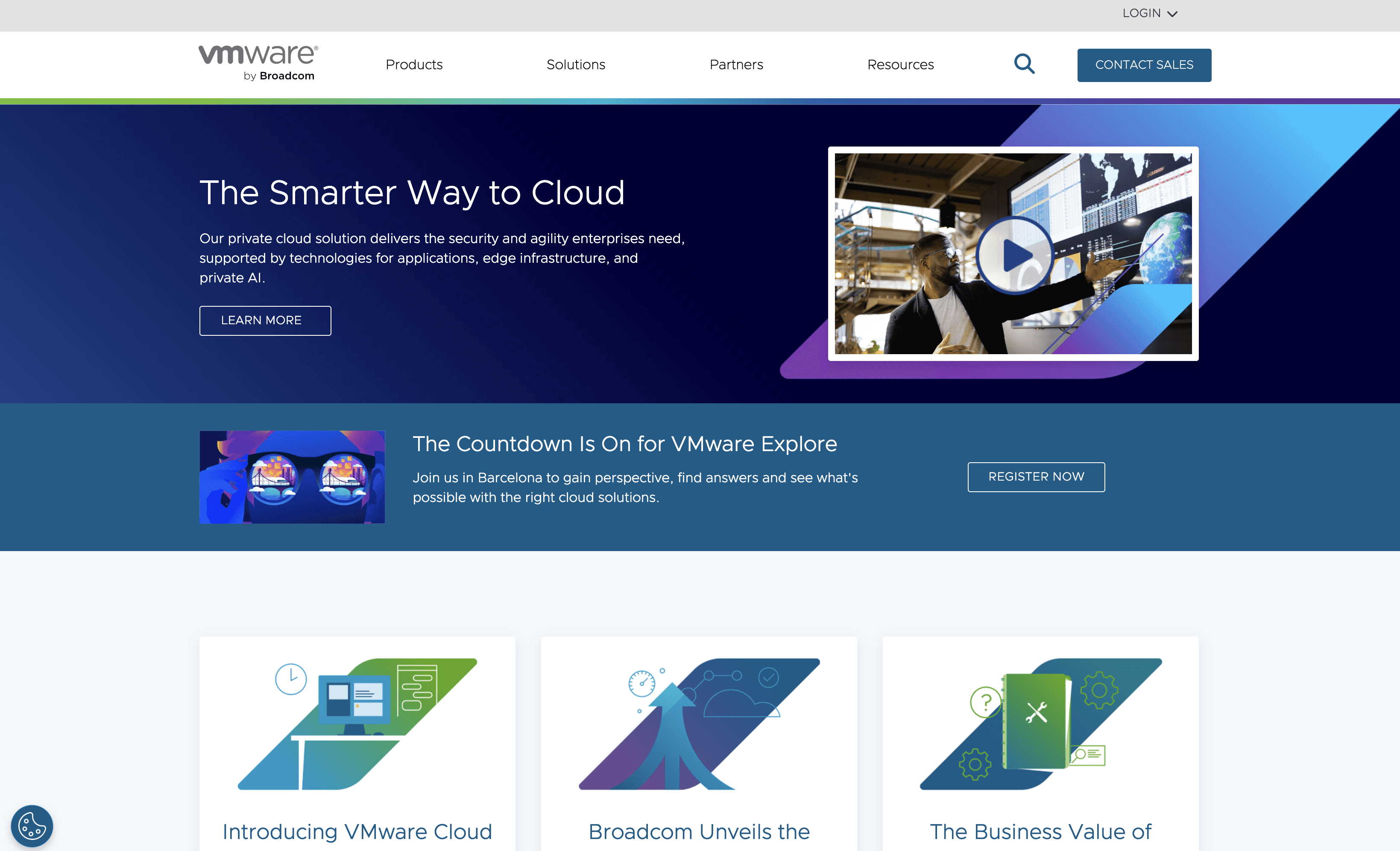
Carbon Black is a cybersecurity solution by VMware designed to protect endpoints through advanced threat detection and response. It integrates seamlessly with existing infrastructure, offering robust security measures and ease of use. Ideal for businesses of all sizes, Carbon Black ensures comprehensive protection against evolving cyber threats.
Carbon Black Pricing
Carbon Black's pricing is not public. Contact their support for more info.
Carbon Black Reviews
Carbon Black has an overall rating of 4.3 out of 5 stars based on 37 reviews. Users appreciate its ease of installation and robust protection. Check out more of our reviews here!
Pros and Cons of Carbon Black
Pros:
Comprehensive Protection: Carbon Black offers robust cybersecurity measures, ensuring thorough protection against a wide range of cyber threats.
Easy Installation: Users appreciate the straightforward installation process, which minimizes setup time and effort.
Effective Monitoring: The platform provides efficient monitoring capabilities, allowing for real-time threat detection and response.
Cons:
Agent Removal Issues: Some users report difficulties in removing agents, which can complicate system management.
Complex Installation: Despite ease for some, others find the installation process complex and time-consuming.
Delay Issues: There are occasional delays in threat detection, which can impact timely response.
5. Crowdstrike
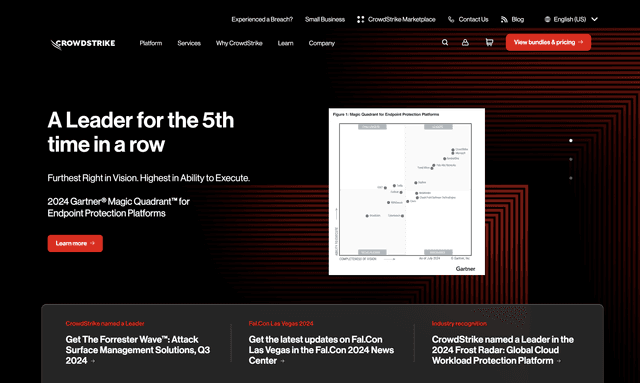
CrowdStrike is a cybersecurity solution that leverages AI to prevent breaches and protect endpoints, identities, and cloud environments. It offers a unified platform, Falcon, which integrates seamlessly with existing infrastructure, providing comprehensive security measures for businesses of all sizes.
Crowdstrike Pricing
Enterprise Bundles:
Falcon Pro: $99.99/device per year
Falcon Enterprise: $184.99/device per year
Falcon Elite: Contact sales for pricing
Small Business Bundles:
Falcon Go: $59.99/device per year
Falcon Pro: $99.99/device per year
Falcon Complete MDR: Contact sales for pricing
Crowdstrike Reviews
Crowdstrike has an overall rating of 4.7 out of 5 stars based on 278 reviews. Users appreciate its advanced threat intelligence and ease of use. Check out more of our reviews here!
Pros and Cons of Crowdstrike
Pros:
AI-native Platform: CrowdStrike's AI-native solutions offer advanced threat detection and response, ensuring robust cybersecurity.
Comprehensive Protection: Unified approach with one agent covers endpoint, identity, and cloud security, simplifying management.
Industry Recognition: Consistently recognized as a leader by Gartner and Forrester, validating its market leadership.
Cons:
Complexity for Small Businesses: Smaller businesses might find the platform overly complex and challenging to manage.
Cost: High cost of advanced solutions can be a barrier for budget-conscious organizations.
False Positives: Instances of false positives can lead to unnecessary alerts and additional management efforts.
6. NinjaOne
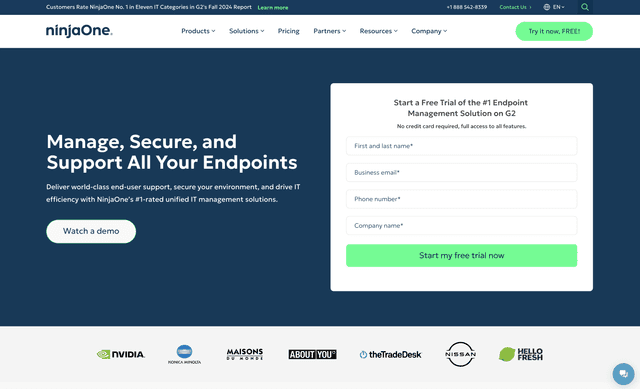
NinjaOne is a unified IT management solution designed to manage, secure, and support all endpoints. It offers features like endpoint management, remote monitoring, patch management, and automation. With an intuitive interface and easy deployment, NinjaOne aims to enhance IT efficiency and provide robust security for businesses of all sizes.
NinjaOne Pricing
NinjaOne's pricing is not public. Contact their support for more info.
NinjaOne Reviews
NinjaOne has an overall rating of 4.8 out of 5 stars based on 1,437 reviews. Users appreciate its ease of use and excellent customer support. Check out more of our reviews here!
Pros and Cons of NinjaOne
Pros:
Ease of Use: NinjaOne is praised for its intuitive interface, making it easy for IT teams to manage and secure endpoints efficiently.
Comprehensive Features: The platform offers a wide range of tools, including remote monitoring, patch management, and endpoint security, ensuring robust IT management.
Excellent Support: Users appreciate the high-quality customer support, which includes free onboarding, training, and ongoing assistance.
Cons:
Missing Features: Some users report that certain advanced features are lacking, which may limit the platform's capabilities for complex IT environments.
Integration Challenges: Integrating NinjaOne with existing systems can be difficult, particularly for smaller IT teams with limited resources.
Feature Issues: Occasional bugs and feature inconsistencies have been noted, requiring additional management and troubleshooting.
7. Bitdefender GravityZone Business Security
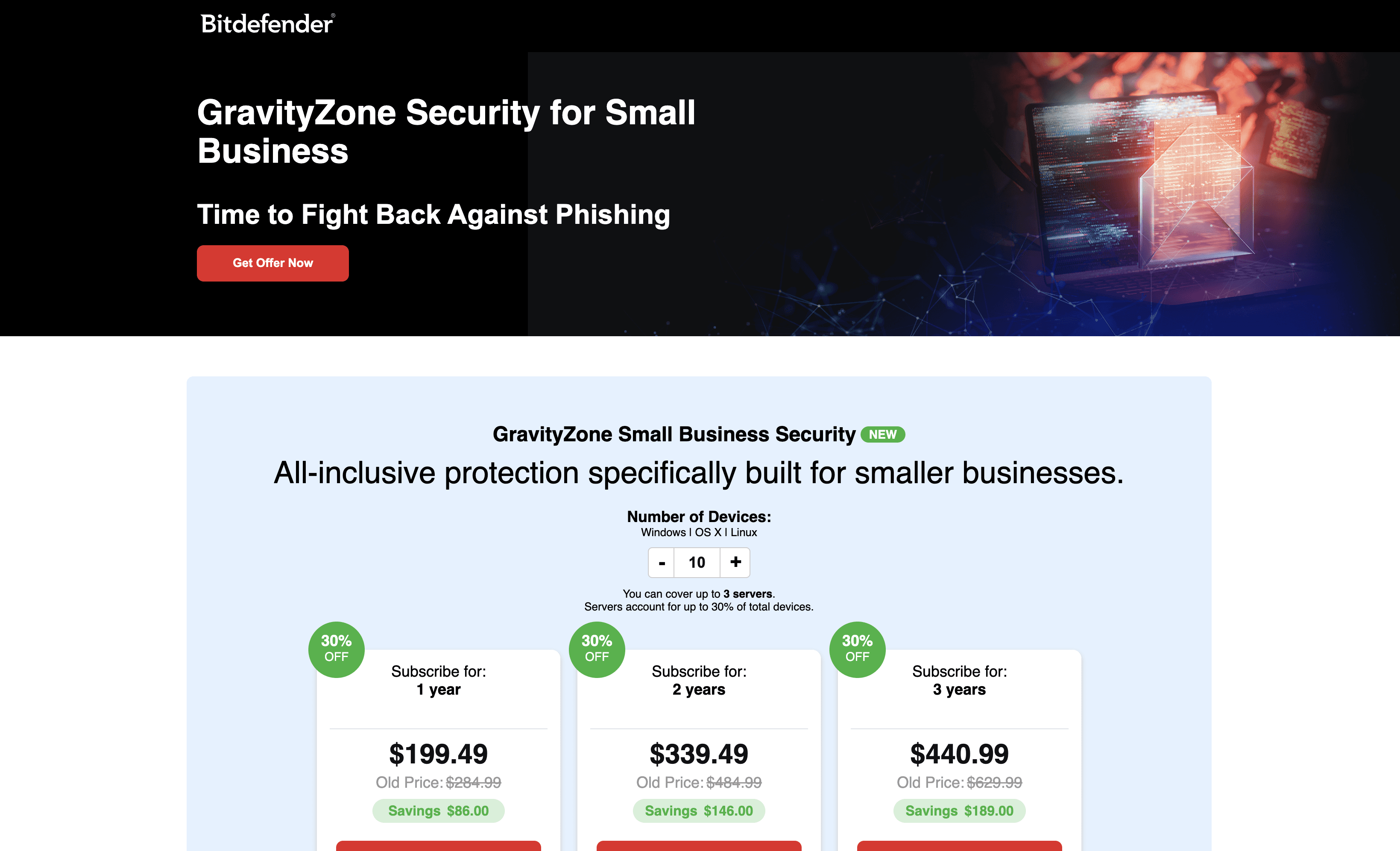
Bitdefender GravityZone Business Security is a comprehensive cybersecurity solution designed to protect businesses from a wide range of threats. It offers advanced features like anti-phishing, ransomware protection, and web threat prevention, all managed through a user-friendly console, making it ideal for businesses of all sizes.
Bitdefender GravityZone Business Security Pricing
1 Year Subscription: $199.49
2 Years Subscription: $339.49
3 Years Subscription: $440.99
Bitdefender GravityZone Business Security Reviews
Bitdefender GravityZone Business Security has an overall rating of 4.0 out of 5 stars based on 65 reviews. Users appreciate its robust web threat detection and helpful support. Check out more of our reviews here!
Pros and Cons of Bitdefender GravityZone Business Security
Pros:
Effective Anti-Phishing: Blocks known phishing pages and provides adaptive defense against online scams.
Fraud Prevention: Extends protection to various types of scams beyond phishing.
Ransomware Protection: Offers multiple layers of defense against ransomware, including mitigation and recovery options.
Cons:
Complex Interface: Users report that the interface can be difficult to navigate, leading to a steeper learning curve.
Subscription-Based Model: Requires ongoing subscription payments, which may be a consideration for budget-conscious businesses.
Limited Server Coverage: Can cover up to 3 servers, which may not be sufficient for larger small businesses.
8. Avast Endpoint Protection
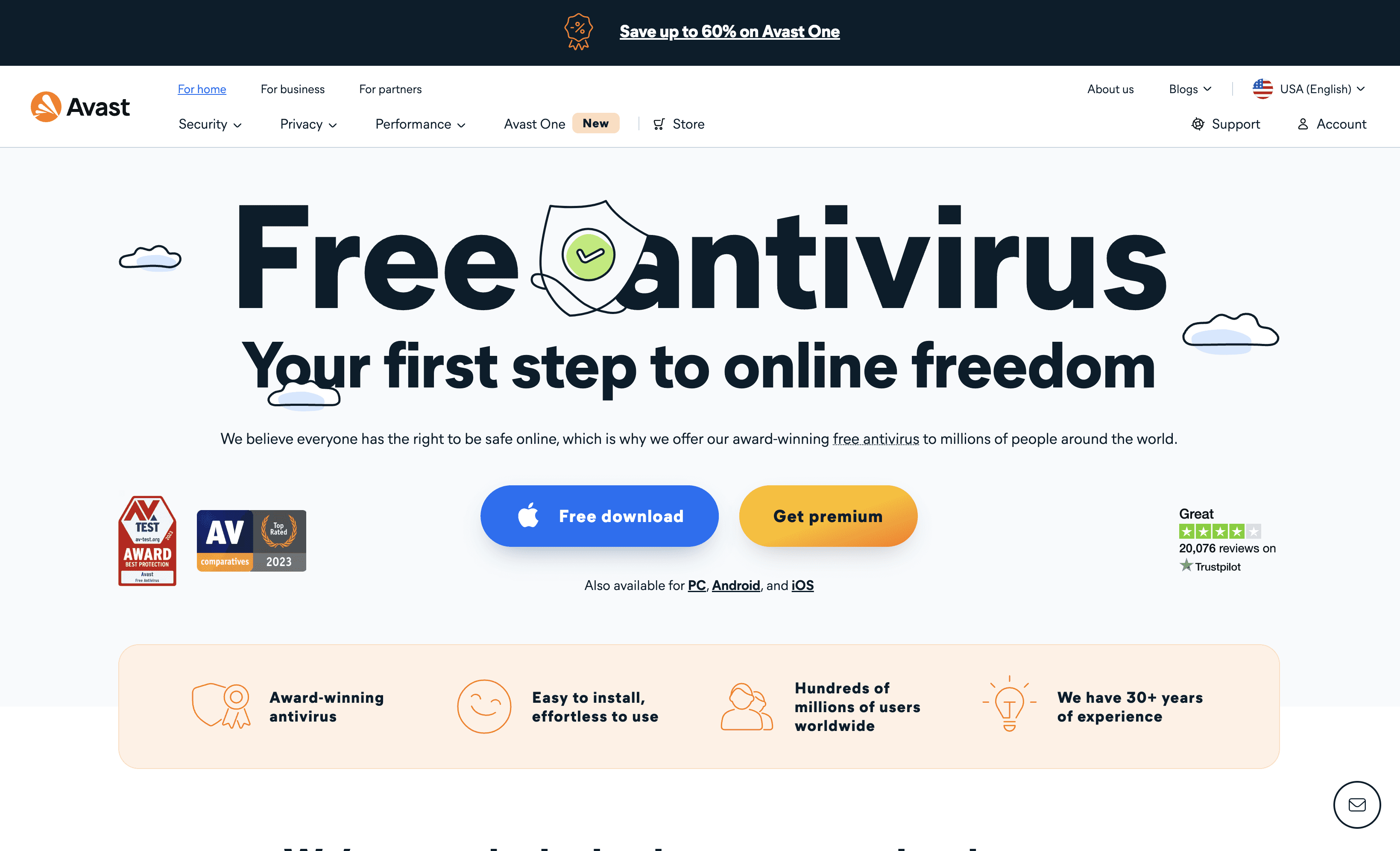
Avast Endpoint Protection is a cybersecurity solution designed to safeguard businesses from a wide range of threats. It offers advanced features like anti-phishing, ransomware protection, and web threat prevention, all managed through an intuitive console. Ideal for businesses of all sizes, it ensures robust and efficient security.
Avast Endpoint Protection Pricing
Avast Essential Business Security: $148.36 per year
Avast Premium Business Security: $187.00 per year
Avast Ultimate Business Security: $227.08 per year
Avast Endpoint Protection Reviews
Avast Endpoint Protection has an overall rating of 4.4 out of 5 stars based on 101 reviews. Users appreciate its rich security features and user-friendly controls. Check out more of our reviews here!
Pros and Cons of Avast Endpoint Protection
Pros:
Effective Malware Detection: Recognized for its high success rate in identifying and neutralizing malware threats, ensuring robust endpoint security.
User-Friendly Interface: The intuitive design makes it easy for users to navigate and manage security settings without technical expertise.
Comprehensive Protection Suite: Offers a wide range of features, including antivirus, VPN, and cleanup tools, providing all-in-one security.
Cons:
Performance Impact: Some users report that the software can slow down system performance, particularly on older machines.
Privacy Concerns: Past issues with data collection practices have raised concerns about user privacy and data security.
Frequent Ads: The free version includes numerous pop-ups and ads, which can be intrusive and push users towards paid versions.
9. Cisco Secure Endpoint
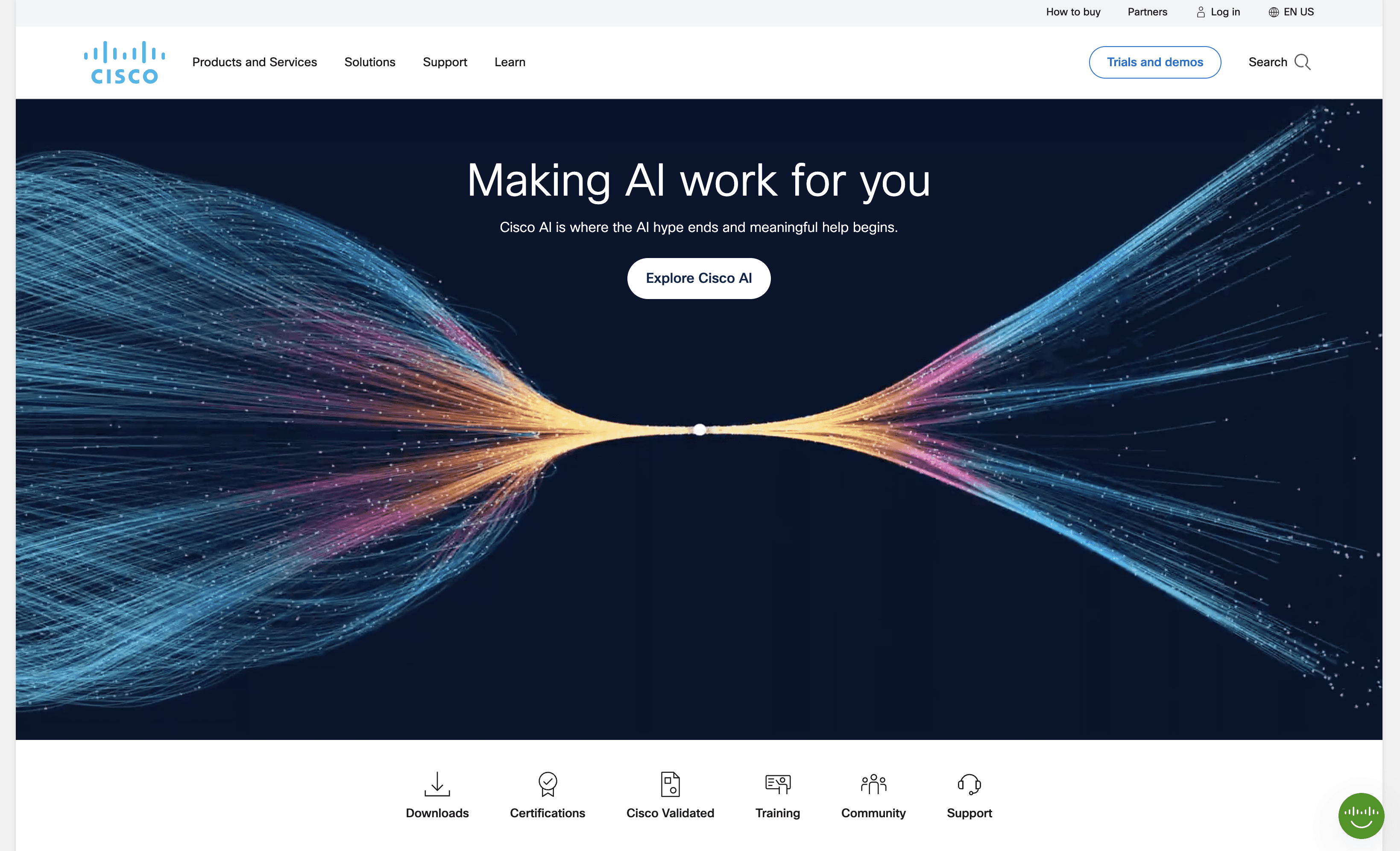
Cisco Secure Endpoint is a cloud-native solution designed to provide advanced endpoint security. It focuses on early threat detection, streamlined investigations, and integrated XDR capabilities. With built-in threat hunting and risk-based vulnerability management, it aims to reduce remediation times and enhance overall security for businesses of all sizes.
Cisco Secure Endpoint Pricing
Cisco Secure Endpoint's pricing is not public. Contact their support for more info.
Cisco Secure Endpoint Reviews
Cisco Secure Endpoint has an overall rating of 4.5 out of 5 stars based on 21 reviews. Users appreciate its ease of use and deployment. Check out more of our reviews here!
Pros and Cons of Cisco Secure Endpoint
Pros:
Powerful EDR Capabilities: Advanced endpoint detection and response, threat hunting, and risk-based vulnerability management.
Streamlined Investigations: Quick answers about endpoints with Orbital Advanced Search capability.
Integrated XDR Capabilities: Unified view, simplified incident management, and automated playbooks with the SecureX platform.
Cons:
Complexity: The integration of multiple advanced features might be complex for some users to manage.
Cost: High-end security solutions like Cisco Secure Endpoint can be expensive, which might be a concern for smaller organizations.
Learning Curve: Advanced features and capabilities might require significant training and expertise to utilize effectively.
10. Kaspersky Endpoint Security Cloud
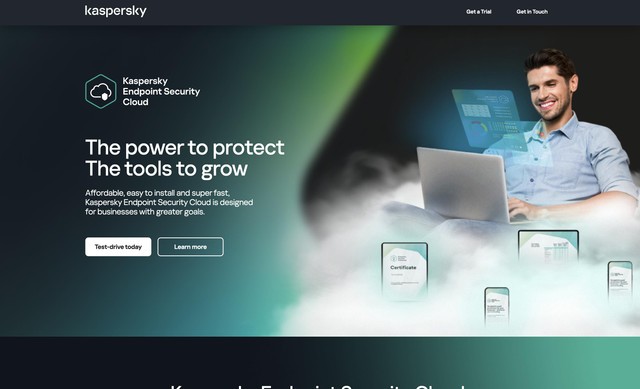
Kaspersky Endpoint Security Cloud is a cybersecurity solution designed for small to medium-sized businesses. It offers comprehensive protection against malware, ransomware, and other threats, all managed through an intuitive cloud-based console. With easy deployment and ongoing support, it ensures robust security with minimal management effort.
Kaspersky Endpoint Security Cloud Pricing
Kaspersky Endpoint Security Cloud's pricing is not public. Contact their support for more info.
Kaspersky Endpoint Security Cloud Reviews
Kaspersky Endpoint Security Cloud has an overall rating of 4.3 out of 5 stars based on 217 reviews. Users appreciate its effective antivirus protection and ease of use. Check out more of our reviews here!
Pros and Cons of Kaspersky Endpoint Security Cloud
Pros:
Affordable and Easy to Install: Designed for small to medium-sized businesses, it offers cost-effective, quick installation.
Comprehensive Protection: Provides robust defense against malware, ransomware, and other threats, ensuring business security.
Ease of Management: The intuitive cloud-based console simplifies security management, requiring minimal time and effort.
Cons:
High Resource Usage: Some users report that the software can be resource-intensive, affecting system performance.
Complex Console Management: The management console can be difficult to navigate, leading to a steeper learning curve.
Compatibility Issues: Users have experienced difficulties integrating the software with certain systems and applications.
Looking to secure your technical infrastructure?
Twingate offers granular access controls and deployment automations to protect your VPC environment. By leveraging Zero Trust security tools, Twingate ensures that private resources and internet traffic remain secure in the modern world of work. Try Twingate for Free today!
Rapidly implement a modern Zero Trust network that is more secure and maintainable than VPNs.
The Best 10 Alternatives to Forticlient (+ Pricing & Reviews)
Twingate Team
•
Jul 27, 2024

FortiClient is a security solution by Fortinet that offers Zero Trust Network Access, web filtering, software inventory management, and automated response for endpoint protection. While it provides comprehensive features, it may not suit everyone's needs. This article explores the importance of endpoint security and management.

10 Alternatives to Forticlient
1. Trend Vision One

Trend Vision One is a comprehensive endpoint security solution by Trend Micro. It consolidates endpoint, server, and workload security with centralized management. The platform enhances detection and response capabilities, streamlines IT operations, and offers advanced threat protection, making it suitable for businesses seeking robust and efficient security measures.
Trend Vision One Pricing
Trend Vision One's pricing is not public. Contact their support for more info.
Trend Vision One Reviews
Trend Vision One has an overall rating of 4.7 out of 5 stars based on 183 reviews. Users praise its comprehensive threat intelligence and ease of use. Check out more of our reviews here!
Pros and Cons of Trend Vision One
Pros:
Centralized management consolidates endpoint, server, and workload security, providing a unified view and streamlined operations.
Enhanced detection and response capabilities with EDR and XDR offer comprehensive threat visibility and faster incident resolution.
Layered protection ensures robust defense across all attack stages, proactively mitigating vulnerabilities before they can be exploited.
Cons:
Complexity in managing the comprehensive features may require significant expertise and resources, posing a challenge for smaller teams.
High cost of advanced security solutions and managed services can be a barrier for budget-conscious organizations.
Integration with existing systems and workflows might be difficult, depending on the current infrastructure and compatibility.
2. Cylance

Cylance is an AI-driven cybersecurity solution by BlackBerry, designed to prevent, detect, and respond to threats across endpoints. It offers low CPU utilization and integrates seamlessly with existing infrastructure, making it a practical choice for businesses seeking robust and efficient security measures.
Cylance Pricing
Cylance's pricing is not public. Contact their support for more info.
Cylance Reviews
Cylance has an overall rating of 4.3 out of 5 stars based on 57 reviews. Users appreciate its ease of use and AI-driven approach. Check out more of our reviews here!
Pros and Cons ofCylance
Pros:
High Efficacy: Cylance AI-driven solutions deliver some of the highest efficacy ratings in the market, ensuring robust protection against threats.
Low CPU Utilization: Uses up to 20x less CPU, even offline, making it efficient and less resource-intensive.
Comprehensive Security: Provides broad, integrated controls spanning network, endpoint, and cloud, offering a holistic security approach.
Cons:
Initial Training Required: The product needs an initial period to be "trained" to the specific environment, which can be time-consuming.
Compatibility Issues: Some users report difficulties integrating Cylance with existing systems, leading to potential operational disruptions.
False Positives: There are instances of false positives, which can cause unnecessary alerts and require additional management.
3. Sophos Intercept X Endpoint Protection

Sophos Intercept X Endpoint Protection is a security solution designed to prevent, detect, and respond to threats using advanced technologies like AI and behavioral analysis. It offers comprehensive protection against ransomware, exploits, and data breaches, making it a reliable choice for businesses seeking robust endpoint security.
Sophos Intercept X Endpoint Protection Pricing
Sophos Intercept X Endpoint Protection's pricing is not public. Contact their support for more info.
Sophos Intercept X Endpoint Protection Reviews
Sophos Intercept X Endpoint Protection has an overall rating of 3.9 out of 5 stars based on 30 reviews. Users appreciate its ease of use and effective ransomware protection. Check out more of our reviews here!
Pros and Cons of Sophos Intercept X Endpoint Protection
Pros:
High Customer Ratings: Sophos Intercept X boasts a 4.8/5.0 rating based on 473 reviews, reflecting strong user satisfaction.
Comprehensive Security: Incorporates AI, behavioral analysis, anti-ransomware, and anti-exploitation technologies for robust protection.
Ease of Management: Managed through a cloud-based platform, simplifying the deployment and maintenance of security measures.
Cons:
False Positives: Users report occasional false positives, which can lead to unnecessary alerts and additional management.
Integration Issues: Some users experience difficulties integrating with newer Windows versions, causing potential disruptions.
Speed Issues: Initial boot-up times and system functions can be slow, particularly on non-SSD drives.
4. Carbon Black

Carbon Black is a cybersecurity solution by VMware designed to protect endpoints through advanced threat detection and response. It integrates seamlessly with existing infrastructure, offering robust security measures and ease of use. Ideal for businesses of all sizes, Carbon Black ensures comprehensive protection against evolving cyber threats.
Carbon Black Pricing
Carbon Black's pricing is not public. Contact their support for more info.
Carbon Black Reviews
Carbon Black has an overall rating of 4.3 out of 5 stars based on 37 reviews. Users appreciate its ease of installation and robust protection. Check out more of our reviews here!
Pros and Cons of Carbon Black
Pros:
Comprehensive Protection: Carbon Black offers robust cybersecurity measures, ensuring thorough protection against a wide range of cyber threats.
Easy Installation: Users appreciate the straightforward installation process, which minimizes setup time and effort.
Effective Monitoring: The platform provides efficient monitoring capabilities, allowing for real-time threat detection and response.
Cons:
Agent Removal Issues: Some users report difficulties in removing agents, which can complicate system management.
Complex Installation: Despite ease for some, others find the installation process complex and time-consuming.
Delay Issues: There are occasional delays in threat detection, which can impact timely response.
5. Crowdstrike

CrowdStrike is a cybersecurity solution that leverages AI to prevent breaches and protect endpoints, identities, and cloud environments. It offers a unified platform, Falcon, which integrates seamlessly with existing infrastructure, providing comprehensive security measures for businesses of all sizes.
Crowdstrike Pricing
Enterprise Bundles:
Falcon Pro: $99.99/device per year
Falcon Enterprise: $184.99/device per year
Falcon Elite: Contact sales for pricing
Small Business Bundles:
Falcon Go: $59.99/device per year
Falcon Pro: $99.99/device per year
Falcon Complete MDR: Contact sales for pricing
Crowdstrike Reviews
Crowdstrike has an overall rating of 4.7 out of 5 stars based on 278 reviews. Users appreciate its advanced threat intelligence and ease of use. Check out more of our reviews here!
Pros and Cons of Crowdstrike
Pros:
AI-native Platform: CrowdStrike's AI-native solutions offer advanced threat detection and response, ensuring robust cybersecurity.
Comprehensive Protection: Unified approach with one agent covers endpoint, identity, and cloud security, simplifying management.
Industry Recognition: Consistently recognized as a leader by Gartner and Forrester, validating its market leadership.
Cons:
Complexity for Small Businesses: Smaller businesses might find the platform overly complex and challenging to manage.
Cost: High cost of advanced solutions can be a barrier for budget-conscious organizations.
False Positives: Instances of false positives can lead to unnecessary alerts and additional management efforts.
6. NinjaOne

NinjaOne is a unified IT management solution designed to manage, secure, and support all endpoints. It offers features like endpoint management, remote monitoring, patch management, and automation. With an intuitive interface and easy deployment, NinjaOne aims to enhance IT efficiency and provide robust security for businesses of all sizes.
NinjaOne Pricing
NinjaOne's pricing is not public. Contact their support for more info.
NinjaOne Reviews
NinjaOne has an overall rating of 4.8 out of 5 stars based on 1,437 reviews. Users appreciate its ease of use and excellent customer support. Check out more of our reviews here!
Pros and Cons of NinjaOne
Pros:
Ease of Use: NinjaOne is praised for its intuitive interface, making it easy for IT teams to manage and secure endpoints efficiently.
Comprehensive Features: The platform offers a wide range of tools, including remote monitoring, patch management, and endpoint security, ensuring robust IT management.
Excellent Support: Users appreciate the high-quality customer support, which includes free onboarding, training, and ongoing assistance.
Cons:
Missing Features: Some users report that certain advanced features are lacking, which may limit the platform's capabilities for complex IT environments.
Integration Challenges: Integrating NinjaOne with existing systems can be difficult, particularly for smaller IT teams with limited resources.
Feature Issues: Occasional bugs and feature inconsistencies have been noted, requiring additional management and troubleshooting.
7. Bitdefender GravityZone Business Security

Bitdefender GravityZone Business Security is a comprehensive cybersecurity solution designed to protect businesses from a wide range of threats. It offers advanced features like anti-phishing, ransomware protection, and web threat prevention, all managed through a user-friendly console, making it ideal for businesses of all sizes.
Bitdefender GravityZone Business Security Pricing
1 Year Subscription: $199.49
2 Years Subscription: $339.49
3 Years Subscription: $440.99
Bitdefender GravityZone Business Security Reviews
Bitdefender GravityZone Business Security has an overall rating of 4.0 out of 5 stars based on 65 reviews. Users appreciate its robust web threat detection and helpful support. Check out more of our reviews here!
Pros and Cons of Bitdefender GravityZone Business Security
Pros:
Effective Anti-Phishing: Blocks known phishing pages and provides adaptive defense against online scams.
Fraud Prevention: Extends protection to various types of scams beyond phishing.
Ransomware Protection: Offers multiple layers of defense against ransomware, including mitigation and recovery options.
Cons:
Complex Interface: Users report that the interface can be difficult to navigate, leading to a steeper learning curve.
Subscription-Based Model: Requires ongoing subscription payments, which may be a consideration for budget-conscious businesses.
Limited Server Coverage: Can cover up to 3 servers, which may not be sufficient for larger small businesses.
8. Avast Endpoint Protection

Avast Endpoint Protection is a cybersecurity solution designed to safeguard businesses from a wide range of threats. It offers advanced features like anti-phishing, ransomware protection, and web threat prevention, all managed through an intuitive console. Ideal for businesses of all sizes, it ensures robust and efficient security.
Avast Endpoint Protection Pricing
Avast Essential Business Security: $148.36 per year
Avast Premium Business Security: $187.00 per year
Avast Ultimate Business Security: $227.08 per year
Avast Endpoint Protection Reviews
Avast Endpoint Protection has an overall rating of 4.4 out of 5 stars based on 101 reviews. Users appreciate its rich security features and user-friendly controls. Check out more of our reviews here!
Pros and Cons of Avast Endpoint Protection
Pros:
Effective Malware Detection: Recognized for its high success rate in identifying and neutralizing malware threats, ensuring robust endpoint security.
User-Friendly Interface: The intuitive design makes it easy for users to navigate and manage security settings without technical expertise.
Comprehensive Protection Suite: Offers a wide range of features, including antivirus, VPN, and cleanup tools, providing all-in-one security.
Cons:
Performance Impact: Some users report that the software can slow down system performance, particularly on older machines.
Privacy Concerns: Past issues with data collection practices have raised concerns about user privacy and data security.
Frequent Ads: The free version includes numerous pop-ups and ads, which can be intrusive and push users towards paid versions.
9. Cisco Secure Endpoint

Cisco Secure Endpoint is a cloud-native solution designed to provide advanced endpoint security. It focuses on early threat detection, streamlined investigations, and integrated XDR capabilities. With built-in threat hunting and risk-based vulnerability management, it aims to reduce remediation times and enhance overall security for businesses of all sizes.
Cisco Secure Endpoint Pricing
Cisco Secure Endpoint's pricing is not public. Contact their support for more info.
Cisco Secure Endpoint Reviews
Cisco Secure Endpoint has an overall rating of 4.5 out of 5 stars based on 21 reviews. Users appreciate its ease of use and deployment. Check out more of our reviews here!
Pros and Cons of Cisco Secure Endpoint
Pros:
Powerful EDR Capabilities: Advanced endpoint detection and response, threat hunting, and risk-based vulnerability management.
Streamlined Investigations: Quick answers about endpoints with Orbital Advanced Search capability.
Integrated XDR Capabilities: Unified view, simplified incident management, and automated playbooks with the SecureX platform.
Cons:
Complexity: The integration of multiple advanced features might be complex for some users to manage.
Cost: High-end security solutions like Cisco Secure Endpoint can be expensive, which might be a concern for smaller organizations.
Learning Curve: Advanced features and capabilities might require significant training and expertise to utilize effectively.
10. Kaspersky Endpoint Security Cloud

Kaspersky Endpoint Security Cloud is a cybersecurity solution designed for small to medium-sized businesses. It offers comprehensive protection against malware, ransomware, and other threats, all managed through an intuitive cloud-based console. With easy deployment and ongoing support, it ensures robust security with minimal management effort.
Kaspersky Endpoint Security Cloud Pricing
Kaspersky Endpoint Security Cloud's pricing is not public. Contact their support for more info.
Kaspersky Endpoint Security Cloud Reviews
Kaspersky Endpoint Security Cloud has an overall rating of 4.3 out of 5 stars based on 217 reviews. Users appreciate its effective antivirus protection and ease of use. Check out more of our reviews here!
Pros and Cons of Kaspersky Endpoint Security Cloud
Pros:
Affordable and Easy to Install: Designed for small to medium-sized businesses, it offers cost-effective, quick installation.
Comprehensive Protection: Provides robust defense against malware, ransomware, and other threats, ensuring business security.
Ease of Management: The intuitive cloud-based console simplifies security management, requiring minimal time and effort.
Cons:
High Resource Usage: Some users report that the software can be resource-intensive, affecting system performance.
Complex Console Management: The management console can be difficult to navigate, leading to a steeper learning curve.
Compatibility Issues: Users have experienced difficulties integrating the software with certain systems and applications.
Looking to secure your technical infrastructure?
Twingate offers granular access controls and deployment automations to protect your VPC environment. By leveraging Zero Trust security tools, Twingate ensures that private resources and internet traffic remain secure in the modern world of work. Try Twingate for Free today!
Rapidly implement a modern Zero Trust network that is more secure and maintainable than VPNs.
The Best 10 Alternatives to Forticlient (+ Pricing & Reviews)
Twingate Team
•
Jul 27, 2024

FortiClient is a security solution by Fortinet that offers Zero Trust Network Access, web filtering, software inventory management, and automated response for endpoint protection. While it provides comprehensive features, it may not suit everyone's needs. This article explores the importance of endpoint security and management.

10 Alternatives to Forticlient
1. Trend Vision One

Trend Vision One is a comprehensive endpoint security solution by Trend Micro. It consolidates endpoint, server, and workload security with centralized management. The platform enhances detection and response capabilities, streamlines IT operations, and offers advanced threat protection, making it suitable for businesses seeking robust and efficient security measures.
Trend Vision One Pricing
Trend Vision One's pricing is not public. Contact their support for more info.
Trend Vision One Reviews
Trend Vision One has an overall rating of 4.7 out of 5 stars based on 183 reviews. Users praise its comprehensive threat intelligence and ease of use. Check out more of our reviews here!
Pros and Cons of Trend Vision One
Pros:
Centralized management consolidates endpoint, server, and workload security, providing a unified view and streamlined operations.
Enhanced detection and response capabilities with EDR and XDR offer comprehensive threat visibility and faster incident resolution.
Layered protection ensures robust defense across all attack stages, proactively mitigating vulnerabilities before they can be exploited.
Cons:
Complexity in managing the comprehensive features may require significant expertise and resources, posing a challenge for smaller teams.
High cost of advanced security solutions and managed services can be a barrier for budget-conscious organizations.
Integration with existing systems and workflows might be difficult, depending on the current infrastructure and compatibility.
2. Cylance

Cylance is an AI-driven cybersecurity solution by BlackBerry, designed to prevent, detect, and respond to threats across endpoints. It offers low CPU utilization and integrates seamlessly with existing infrastructure, making it a practical choice for businesses seeking robust and efficient security measures.
Cylance Pricing
Cylance's pricing is not public. Contact their support for more info.
Cylance Reviews
Cylance has an overall rating of 4.3 out of 5 stars based on 57 reviews. Users appreciate its ease of use and AI-driven approach. Check out more of our reviews here!
Pros and Cons ofCylance
Pros:
High Efficacy: Cylance AI-driven solutions deliver some of the highest efficacy ratings in the market, ensuring robust protection against threats.
Low CPU Utilization: Uses up to 20x less CPU, even offline, making it efficient and less resource-intensive.
Comprehensive Security: Provides broad, integrated controls spanning network, endpoint, and cloud, offering a holistic security approach.
Cons:
Initial Training Required: The product needs an initial period to be "trained" to the specific environment, which can be time-consuming.
Compatibility Issues: Some users report difficulties integrating Cylance with existing systems, leading to potential operational disruptions.
False Positives: There are instances of false positives, which can cause unnecessary alerts and require additional management.
3. Sophos Intercept X Endpoint Protection

Sophos Intercept X Endpoint Protection is a security solution designed to prevent, detect, and respond to threats using advanced technologies like AI and behavioral analysis. It offers comprehensive protection against ransomware, exploits, and data breaches, making it a reliable choice for businesses seeking robust endpoint security.
Sophos Intercept X Endpoint Protection Pricing
Sophos Intercept X Endpoint Protection's pricing is not public. Contact their support for more info.
Sophos Intercept X Endpoint Protection Reviews
Sophos Intercept X Endpoint Protection has an overall rating of 3.9 out of 5 stars based on 30 reviews. Users appreciate its ease of use and effective ransomware protection. Check out more of our reviews here!
Pros and Cons of Sophos Intercept X Endpoint Protection
Pros:
High Customer Ratings: Sophos Intercept X boasts a 4.8/5.0 rating based on 473 reviews, reflecting strong user satisfaction.
Comprehensive Security: Incorporates AI, behavioral analysis, anti-ransomware, and anti-exploitation technologies for robust protection.
Ease of Management: Managed through a cloud-based platform, simplifying the deployment and maintenance of security measures.
Cons:
False Positives: Users report occasional false positives, which can lead to unnecessary alerts and additional management.
Integration Issues: Some users experience difficulties integrating with newer Windows versions, causing potential disruptions.
Speed Issues: Initial boot-up times and system functions can be slow, particularly on non-SSD drives.
4. Carbon Black

Carbon Black is a cybersecurity solution by VMware designed to protect endpoints through advanced threat detection and response. It integrates seamlessly with existing infrastructure, offering robust security measures and ease of use. Ideal for businesses of all sizes, Carbon Black ensures comprehensive protection against evolving cyber threats.
Carbon Black Pricing
Carbon Black's pricing is not public. Contact their support for more info.
Carbon Black Reviews
Carbon Black has an overall rating of 4.3 out of 5 stars based on 37 reviews. Users appreciate its ease of installation and robust protection. Check out more of our reviews here!
Pros and Cons of Carbon Black
Pros:
Comprehensive Protection: Carbon Black offers robust cybersecurity measures, ensuring thorough protection against a wide range of cyber threats.
Easy Installation: Users appreciate the straightforward installation process, which minimizes setup time and effort.
Effective Monitoring: The platform provides efficient monitoring capabilities, allowing for real-time threat detection and response.
Cons:
Agent Removal Issues: Some users report difficulties in removing agents, which can complicate system management.
Complex Installation: Despite ease for some, others find the installation process complex and time-consuming.
Delay Issues: There are occasional delays in threat detection, which can impact timely response.
5. Crowdstrike

CrowdStrike is a cybersecurity solution that leverages AI to prevent breaches and protect endpoints, identities, and cloud environments. It offers a unified platform, Falcon, which integrates seamlessly with existing infrastructure, providing comprehensive security measures for businesses of all sizes.
Crowdstrike Pricing
Enterprise Bundles:
Falcon Pro: $99.99/device per year
Falcon Enterprise: $184.99/device per year
Falcon Elite: Contact sales for pricing
Small Business Bundles:
Falcon Go: $59.99/device per year
Falcon Pro: $99.99/device per year
Falcon Complete MDR: Contact sales for pricing
Crowdstrike Reviews
Crowdstrike has an overall rating of 4.7 out of 5 stars based on 278 reviews. Users appreciate its advanced threat intelligence and ease of use. Check out more of our reviews here!
Pros and Cons of Crowdstrike
Pros:
AI-native Platform: CrowdStrike's AI-native solutions offer advanced threat detection and response, ensuring robust cybersecurity.
Comprehensive Protection: Unified approach with one agent covers endpoint, identity, and cloud security, simplifying management.
Industry Recognition: Consistently recognized as a leader by Gartner and Forrester, validating its market leadership.
Cons:
Complexity for Small Businesses: Smaller businesses might find the platform overly complex and challenging to manage.
Cost: High cost of advanced solutions can be a barrier for budget-conscious organizations.
False Positives: Instances of false positives can lead to unnecessary alerts and additional management efforts.
6. NinjaOne

NinjaOne is a unified IT management solution designed to manage, secure, and support all endpoints. It offers features like endpoint management, remote monitoring, patch management, and automation. With an intuitive interface and easy deployment, NinjaOne aims to enhance IT efficiency and provide robust security for businesses of all sizes.
NinjaOne Pricing
NinjaOne's pricing is not public. Contact their support for more info.
NinjaOne Reviews
NinjaOne has an overall rating of 4.8 out of 5 stars based on 1,437 reviews. Users appreciate its ease of use and excellent customer support. Check out more of our reviews here!
Pros and Cons of NinjaOne
Pros:
Ease of Use: NinjaOne is praised for its intuitive interface, making it easy for IT teams to manage and secure endpoints efficiently.
Comprehensive Features: The platform offers a wide range of tools, including remote monitoring, patch management, and endpoint security, ensuring robust IT management.
Excellent Support: Users appreciate the high-quality customer support, which includes free onboarding, training, and ongoing assistance.
Cons:
Missing Features: Some users report that certain advanced features are lacking, which may limit the platform's capabilities for complex IT environments.
Integration Challenges: Integrating NinjaOne with existing systems can be difficult, particularly for smaller IT teams with limited resources.
Feature Issues: Occasional bugs and feature inconsistencies have been noted, requiring additional management and troubleshooting.
7. Bitdefender GravityZone Business Security

Bitdefender GravityZone Business Security is a comprehensive cybersecurity solution designed to protect businesses from a wide range of threats. It offers advanced features like anti-phishing, ransomware protection, and web threat prevention, all managed through a user-friendly console, making it ideal for businesses of all sizes.
Bitdefender GravityZone Business Security Pricing
1 Year Subscription: $199.49
2 Years Subscription: $339.49
3 Years Subscription: $440.99
Bitdefender GravityZone Business Security Reviews
Bitdefender GravityZone Business Security has an overall rating of 4.0 out of 5 stars based on 65 reviews. Users appreciate its robust web threat detection and helpful support. Check out more of our reviews here!
Pros and Cons of Bitdefender GravityZone Business Security
Pros:
Effective Anti-Phishing: Blocks known phishing pages and provides adaptive defense against online scams.
Fraud Prevention: Extends protection to various types of scams beyond phishing.
Ransomware Protection: Offers multiple layers of defense against ransomware, including mitigation and recovery options.
Cons:
Complex Interface: Users report that the interface can be difficult to navigate, leading to a steeper learning curve.
Subscription-Based Model: Requires ongoing subscription payments, which may be a consideration for budget-conscious businesses.
Limited Server Coverage: Can cover up to 3 servers, which may not be sufficient for larger small businesses.
8. Avast Endpoint Protection

Avast Endpoint Protection is a cybersecurity solution designed to safeguard businesses from a wide range of threats. It offers advanced features like anti-phishing, ransomware protection, and web threat prevention, all managed through an intuitive console. Ideal for businesses of all sizes, it ensures robust and efficient security.
Avast Endpoint Protection Pricing
Avast Essential Business Security: $148.36 per year
Avast Premium Business Security: $187.00 per year
Avast Ultimate Business Security: $227.08 per year
Avast Endpoint Protection Reviews
Avast Endpoint Protection has an overall rating of 4.4 out of 5 stars based on 101 reviews. Users appreciate its rich security features and user-friendly controls. Check out more of our reviews here!
Pros and Cons of Avast Endpoint Protection
Pros:
Effective Malware Detection: Recognized for its high success rate in identifying and neutralizing malware threats, ensuring robust endpoint security.
User-Friendly Interface: The intuitive design makes it easy for users to navigate and manage security settings without technical expertise.
Comprehensive Protection Suite: Offers a wide range of features, including antivirus, VPN, and cleanup tools, providing all-in-one security.
Cons:
Performance Impact: Some users report that the software can slow down system performance, particularly on older machines.
Privacy Concerns: Past issues with data collection practices have raised concerns about user privacy and data security.
Frequent Ads: The free version includes numerous pop-ups and ads, which can be intrusive and push users towards paid versions.
9. Cisco Secure Endpoint

Cisco Secure Endpoint is a cloud-native solution designed to provide advanced endpoint security. It focuses on early threat detection, streamlined investigations, and integrated XDR capabilities. With built-in threat hunting and risk-based vulnerability management, it aims to reduce remediation times and enhance overall security for businesses of all sizes.
Cisco Secure Endpoint Pricing
Cisco Secure Endpoint's pricing is not public. Contact their support for more info.
Cisco Secure Endpoint Reviews
Cisco Secure Endpoint has an overall rating of 4.5 out of 5 stars based on 21 reviews. Users appreciate its ease of use and deployment. Check out more of our reviews here!
Pros and Cons of Cisco Secure Endpoint
Pros:
Powerful EDR Capabilities: Advanced endpoint detection and response, threat hunting, and risk-based vulnerability management.
Streamlined Investigations: Quick answers about endpoints with Orbital Advanced Search capability.
Integrated XDR Capabilities: Unified view, simplified incident management, and automated playbooks with the SecureX platform.
Cons:
Complexity: The integration of multiple advanced features might be complex for some users to manage.
Cost: High-end security solutions like Cisco Secure Endpoint can be expensive, which might be a concern for smaller organizations.
Learning Curve: Advanced features and capabilities might require significant training and expertise to utilize effectively.
10. Kaspersky Endpoint Security Cloud

Kaspersky Endpoint Security Cloud is a cybersecurity solution designed for small to medium-sized businesses. It offers comprehensive protection against malware, ransomware, and other threats, all managed through an intuitive cloud-based console. With easy deployment and ongoing support, it ensures robust security with minimal management effort.
Kaspersky Endpoint Security Cloud Pricing
Kaspersky Endpoint Security Cloud's pricing is not public. Contact their support for more info.
Kaspersky Endpoint Security Cloud Reviews
Kaspersky Endpoint Security Cloud has an overall rating of 4.3 out of 5 stars based on 217 reviews. Users appreciate its effective antivirus protection and ease of use. Check out more of our reviews here!
Pros and Cons of Kaspersky Endpoint Security Cloud
Pros:
Affordable and Easy to Install: Designed for small to medium-sized businesses, it offers cost-effective, quick installation.
Comprehensive Protection: Provides robust defense against malware, ransomware, and other threats, ensuring business security.
Ease of Management: The intuitive cloud-based console simplifies security management, requiring minimal time and effort.
Cons:
High Resource Usage: Some users report that the software can be resource-intensive, affecting system performance.
Complex Console Management: The management console can be difficult to navigate, leading to a steeper learning curve.
Compatibility Issues: Users have experienced difficulties integrating the software with certain systems and applications.
Looking to secure your technical infrastructure?
Twingate offers granular access controls and deployment automations to protect your VPC environment. By leveraging Zero Trust security tools, Twingate ensures that private resources and internet traffic remain secure in the modern world of work. Try Twingate for Free today!
Solutions
Solutions
The VPN replacement your workforce will love.
Solutions